The Anganwadi Development Program, initiated by SRF, aimed to enhance early childhood education in Anganwadi Centres. The project aligned with the National Education Policy 2020, focussing on holistic child development and quality education
The Anganwadi Development Program exemplifies SRF’s commitment to nurturing young minds and aligning with national education goals. By transforming Anganwadi Centres, the program positively impacted early childhood education and well-being.
Our vocational skill program is meticulously designed to empower individuals, particularly school dropouts and unemployed youths. By equipping them with valuable skills, we aim to create a sustainable source of income. This initiative aligns with SDG goal number 8, which focusses on decent work and economic growth.
Our success lies in collaborations with corporate partners such as Schneider Electrics, Amway, Microsoft India, Shell Pahal, and Capgemini. Together, we offer a diverse range of programmes, including:
By providing individuals with the necessary skills and training, we not only help them secure a source of income but also empower them to take control of their own futures. Through these strategic partnerships and impactful programmes, we make a positive difference in the lives of those who might otherwise have been left behind in the competitive job market.
The Aravalli region stands as one of India’s most degraded and vulnerable ecosystems. It grapples with challenges such as low rainfall, harsh climate, sandy soils, and limited groundwater recharge, all of which hinder economic development in the area. We are committed to Natural Resource Management (NRM) since 2005, aligns our efforts with SDG goal number 13 (climate action). The focus lies in enhancing livelihoods, conserving the environment, and improving socio-economic conditions in 35 villages within the Tijara Block of Alwar district, Rajasthan.
In collaboration with SPACE (Society for Promotion and Conservation of Environment), SRF embarked on a project involving the construction of 204 earthen pots to harvest rainwater and recharge groundwater in Bhiwadi, Rajasthan. This, along with other initiatives helped us in recharging groundwater by 7.6 lakh KL during the year.
Additionally, in FY24, 305 fodder plants were strategically planted in unused areas in Gualda village and on Dhakpuri village. These plantations were established in regions with accessible water sources, garnering active participation from local farmers dedicated to safeguarding the newly planted vegetation, ultimately benefiting 8,100 families.
Furthermore, SRF joined forces with the Global Vikas Trust (GVT) in Dhar, Madhya Pradesh to bolster farmers’ income. This collaboration resulted in the planting of a substantial 3,80,000 saplings. These efforts directly impacted 122 farmer families and indirectly benefited 150-200 farmer families. This initiative represents a significant stride toward agricultural advancement and economic empowerment within the region.
To enhance the income and livelihoods of farmers engaged in traditional crop cultivation by promoting modern farming practices, crop diversification, and adoption of horticulture, ultimately leading to sustainable agricultural development.
Cropping Pattern Change: Farmers transitioned from traditional to modern farming practices, leading to increased productivity and profitability.
Adoption of Tissue Culture Plants: Cultivation of tissue culture plants replaced traditional sucker plantation, resulting in improved crop quality and uniform growth.
Skill Development: Farmers’ skills were enhanced through timely and adequate training, empowering them to implement modern farming techniques effectively.
Cluster Plantation: Plantation in clusters facilitated market access and improved market competitiveness for farmers.
Financial Impact: Financial impact case studies will be provided upon completion of the harvest, showcasing the tangible benefits accrued to participating farmers.
3,80,300 high-quality plants distributed across 224 acres, benefiting 103 marginal farmers.
SRF has undertaken health care initiatives aimed at providing high-quality medical facilities to people from weaker sections of society who reside in remote and challenging areas. These individuals often face challenges in accessing the healthcare services due to geographical isolation.
We have implemented two key initiatives to promote health care facilities:
Primary Health Centre in Nalchha Block, Dhar District, Madhya Pradesh:
Swasthya Sewa Van (Mobile Health Van):
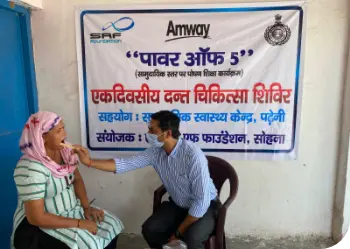
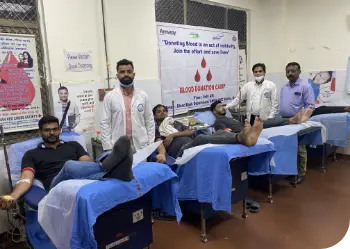
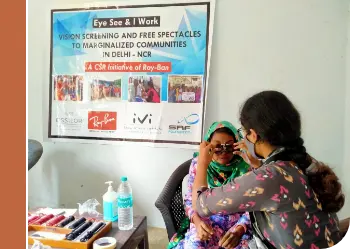
Pre project scenario - Upon conducting a comprehensive survey and physical visits to four Primary Health Centres (PHCs) and Community Health Centres (CHCs) in Nalchha, it was observed that PHC Nalchha experienced significantly higher patient footfall compared to other centres. This scenario highlighted the need for improving healthcare accessibility in Nalchha.
The initiative aimed to upgrade existing facilities, enhance processes, and build staff capacity through training programmes, exposure visits, and technical support. It also focussed on strengthening community outreach programmes to raise awareness about preventive healthcare, routine immunisation, and maternal and child healthcare.
The project began with a baseline assessment using KAYAKALP and NQAS checklists to form an actionable plan. It involved mentoring visits, periodic assessments, infrastructure upgrades, and procurement of medical equipment. Collaboration with local government and community stakeholders facilitated project implementation.
Reached a population of 57,092 and covered 51 villages under PHC benefiting 24,490 individuals with health services. PHC Nalchha received the state-level Kayakalp Award for its improved healthcare services, marking a notable achievement in healthcare accessibility and quality.
Mobile Health Dispensary initiative, known as SRF Swasthya Seva’s aim is to address the challenge of limited access to basic healthcare services for the local community in the Dahej area of Bharuch district. The initiative aimed to provide easy access to doctor consultations and medicines at the doorstep of residents in 15 project villages, overcoming the barriers posed by distance and lack of amenities.
To address the healthcare challenges, SRF has implemented a mobile medical van equipped with a MBBS certified doctor and a nurse. The team provided consultations and distributed free medicines to patients at their doorstep. For cases requiring specialised care, referrals were made to government hospitals in Bharuch. Additionally, medical camps on various specialties such as orthopaedics, general medicine, gynaecology, and eye care were organised regularly to address specific health needs of the community. Swasthya Seva also conducted awareness sessions on basic health practices and hygiene within the community to promote preventive healthcare.
The initiative is an ongoing programme, providing regular services to the 15 project villages twice a month.
During the financial year 2023-24, a total of 4,946 patients benefited from the regular OPD services, receiving free medicines and medical advice. This initiative has had a significant impact on the community, covering approximately one-third of the population in the 15 villages. The initiative has not only addressed immediate healthcare needs but has also empowered the community with knowledge on basic health practices and hygiene.
SRF, in collaboration with SPIC MACAY, has launched the SRF Virasat initiative to promote Indian classical music, dance, and culture. Through this initiative, children are provided with the opportunity to collaborate with singers and showcase their talents in front of audiences, thereby nurturing their social and interpersonal skills. By supporting art and culture in this manner, the SRF Foundation plays a crucial role in preserving and promoting our rich cultural traditions for the enjoyment of future generations.
Music in the Park initiative served as a quintessential example of the celebration and promotion of Indian classical music. Supported by SRF and Foundation, in collaboration with Spic Macay, the events featured legendary artists like Pt Nityanand Haldipur, Ustad Shahid Parvez, Shri Omkar Dadarkar, Pt Bickram Ghosh, and Dr N Rajam, alongside emerging talents. With over 5,000 attendees, the concerts not only mesmerised the audience but also sparked a demand for more such cultural gatherings. Backed by 150 dedicated volunteers and propelled by social and print media publicity, the initiative not only promoted India’s rich musical heritage but also underscored the significance of continued support for similar endeavours, leaving an indelible mark on the cultural landscape of the region.
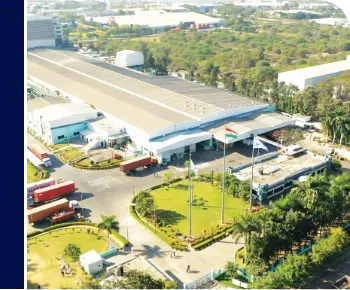
To meet the growing demand for packaging films globally, a new manufacturing plant was set up in Indore in 2004. Currently, the Indore (SEZ) plant has an output capacity of 1,58,200 Tonnes per annum and houses a state-of-the-art R&D centre.
At SRF Limited, our commitment to building long-term value extends beyond financial metrics. Our holistic approach to customer relationship involves understanding their needs, delivering quality products, and fostering transparent communication. By consistently meeting customer expectations, we aim to create enduring partnerships that contribute to our shared success.
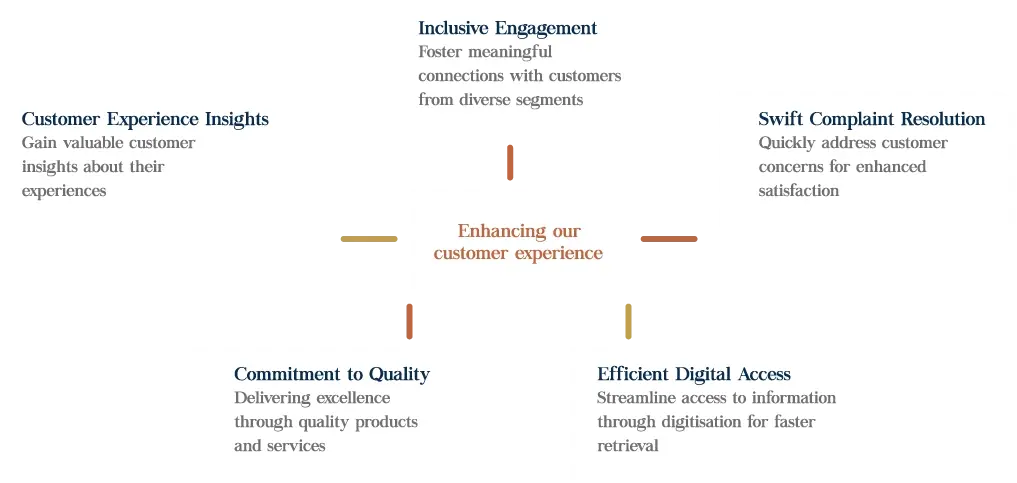
We actively seek customer feedback to enhance our products and services. Through regular satisfaction surveys, we identify areas for improvement and take corrective measures to ensure exceptional customer service. Our sustained efforts in enhancing customer satisfaction underscore our dedication to responsible business practices and stakeholder well-being.

To ensure transparency in information dissemination, SRF diligently ensures that all pertinent details regarding the product are clearly stated on the labels. This encompasses usage instructions, product grade, dimensions, gross weight, and any relevant regulatory mandates. Furthermore, supplementary information like material factsheets, safety guidelines, adherence to Zero ODS standards, handling instructions, hazard classifications (for hazardous materials), or any additional details requested by the customer are also provided on the labels. Our Chemicals business goes beyond mere compliance with state and national laws; it adheres to all applicable international standards and regulations such as the Globally Harmonised System (GHS), Classification, Labelling and Packaging (CLP) notification, International Maritime Dangerous Goods (IMDG) Code, among others.
We firmly believe that sustainability is integral to building a successful business, one that offers products that are not only sustainable but also affordable and accessible to all. At SRF, we are dedicated to the development of sustainable products, achieved through investments in design thinking, disruptive innovation, and the deployment of new technologies.
Our track record in the fluorochemical space illustrates our commitment to sustainability, transitioning from CFCs to HCFCs and then to HFCs, enabling customers to adopt lower GWP potential refrigerant gas products. We are the only Indian manufacturer of ozone-friendly refrigerants such as F134a and F32. The technology to produce refrigerants F 134a and F 32 has been developed by SRF in-house. SRF is one amongst the very few fully backward-integrated players in this space. This not only allows us greater control on product quality but also makes us a very competitive producer.
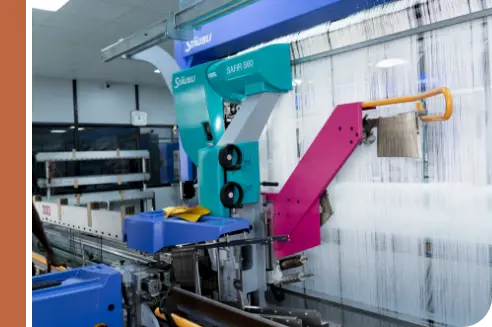
With integrated facilities and robust R&D capabilities, we are confident in our ability to meet future challenges and fulfil customer requirements. In the specialty chemicals sector, our R&D team continues to lead the way, successfully launching new generation products and expanding our expertise beyond fluorine chemistry. We excel in managing complex custom synthesis and other contract development and manufacturing operations, maintaining our leadership position in certain chemistries. To sustain this position, we've made substantial investments in people, equipment, and capital, fostering an environment of agile process development and rapid project implementation. Despite a challenging business environment, our Packaging Films and Technical Textiles businesses have demonstrated remarkable resilience. This year, they focussed on optimising cost structures and introduced innovative products and solutions to customers.
At SRF, we appreciate the invaluable contributions made by our partners to the growth and sustenance of our business. We recognise that the sustainability of our products and operations rely on the ethical and environmentally conscious practices of our suppliers. Therefore, we are dedicated to fostering strong relationships with our suppliers which is based on mutual respect, transparency, and collaboration. We maintain regular communication with our suppliers to uphold integrity, responsibility, and compliance standards.
To foster sustainable practices throughout our value chain, we organise training and awareness sessions for suppliers and buyers covering requirements of the Code and Human Rights Policy, sustainability expectations from suppliers.
In certain segments, we have signed long-term contracts with vendors for critical raw materials. These contracts feature formula-driven price discovery agreements and automated indenting to ensure continuous supply.
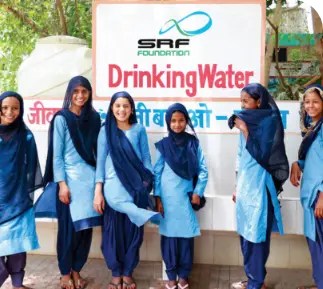
Society for Education and Welfare Development was renamed as SRF Foundation to better align with SRF Limited. SRF Foundation is dedicated to the transformation of education in the country.